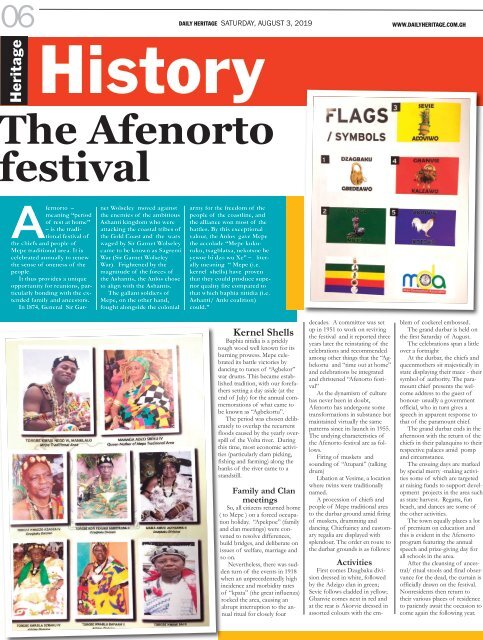You also want an ePaper? Increase the reach of your titles
YUMPU automatically turns print PDFs into web optimized ePapers that Google loves.
06<br />
DAILY HERITAGE SATURDAY, AUGUST 3, 2019<br />
WWW.DAILYHERITAGE.COM.GH<br />
History<br />
The Afenorto<br />
festival<br />
Afernorto –<br />
meaning “period<br />
of rest at home”<br />
– is the traditional<br />
festival of<br />
the chiefs and people of<br />
Mepe traditional area. It is<br />
celebrated annually to renew<br />
the sense of oneness of the<br />
people.<br />
It thus provides a unique<br />
opportunity for reunions, particularly<br />
bonding with the extended<br />
family and ancestors.<br />
In 1874, General Sir Garnet<br />
Wolseley moved against<br />
the enemies of the ambitious<br />
Ashanti kingdom who were<br />
attacking the coastal tribes of<br />
the Gold Coast and the wars<br />
waged by Sir Garnet Wolseley<br />
came to be known as Sagrenti<br />
War (Sir Garnet Wolseley<br />
War). Frightened by the<br />
magnitude of the forces of<br />
the Ashantis, the Anlos chose<br />
to align with the Ashantis.<br />
The gallant soldiers of<br />
Mepe, on the other hand,<br />
fought alongside the colonial<br />
army for the freedom of the<br />
people of the coastline, and<br />
the alliance won most of the<br />
battles. By this exceptional<br />
valour, the Anlos gave Mepe<br />
the accolade “Mepe kukuruku,<br />
tsagblatsa, nekotsoe be<br />
yewoe bi dzo wu Xe” – literally<br />
meaning “ Mepe (i.e.<br />
kernel shells) have proven<br />
that they could produce superior<br />
quality fire compared to<br />
that which baphia nitidia (i.e.<br />
Ashanti/ Anlo coalition)<br />
could.”<br />
Kernel Shells<br />
Baphia nitidia is a prickly<br />
tough wood well known for its<br />
burning prowess. Mepe celebrated<br />
its battle victories by<br />
dancing to tunes of “Agbekor”<br />
war drums. This became established<br />
tradition, with our forefathers<br />
setting a day aside (at the<br />
end of July) for the annual commemorations<br />
of what came to<br />
be known as “Agbekortu”.<br />
The period was chosen deliberately<br />
to overlap the recurrent<br />
floods caused by the yearly overspill<br />
of the Volta river. During<br />
this time, most economic activities<br />
(particularly clam picking,<br />
fishing and farming) along the<br />
banks of the river came to a<br />
standstill.<br />
Family and Clan<br />
meetings<br />
So, all citizens returned home<br />
( to Mepe ) on a forced occupation<br />
holiday. “Apekpoe” (family<br />
and clan meetings) were convened<br />
to resolve differences,<br />
build bridges, and deliberate on<br />
issues of welfare, marriage and<br />
so on.<br />
Nevertheless, there was sudden<br />
turn of the events in 1918<br />
when an unprecedentedly high<br />
incidence and morbidity rates<br />
of “kpata” (the great influenza)<br />
rocked the area, causing an<br />
abrupt interruption to the annual<br />
ritual for closely four<br />
decades. A committee was set<br />
up in 1951 to work on reviving<br />
the festival and it reported three<br />
years later the reinstating of the<br />
celebrations and recommended<br />
among other things that the “Agbekortu<br />
and “time out at home”<br />
and celebrations be integrated<br />
and christened “Afenorto festival”<br />
As the dynamism of culture<br />
has never been in doubt,<br />
Afenorto has undergone some<br />
transformations in substance but<br />
maintained virtually the same<br />
patterns since its launch in 1955.<br />
The undying characteristics of<br />
the Afenorto festival are as follows.<br />
Firing of muskets and<br />
sounding of “Atupani” (talking<br />
drum)<br />
Libation at Vesime, a location<br />
where twins were traditionally<br />
named.<br />
A procession of chiefs and<br />
people of Mepe traditional area<br />
to the durbar ground amid firing<br />
of muskets, drumming and<br />
dancing. Chieftaincy and customary<br />
regalia are displayed with<br />
splendour. The order en route to<br />
the durbar grounds is as follows:<br />
Activities<br />
First comes Dzagbaku division<br />
dressed in white, followed<br />
by the Adzigo clan in green;<br />
Sevie follows cladded in yellow;<br />
Gbanvie comes next in red and<br />
at the rear is Akorvie dressed in<br />
assorted colours with the emblem<br />
of cockerel embossed.<br />
The grand durbar is held on<br />
the first Saturday of August.<br />
The celebrations span a little<br />
over a fortnight<br />
At the durbar, the chiefs and<br />
queenmothers sit majestically in<br />
state displaying their mace - their<br />
symbol of authority. The paramount<br />
chief presents the welcome<br />
address to the guest of<br />
honour- usually a government<br />
official, who in turn gives a<br />
speech in apparent response to<br />
that of the paramount chief.<br />
The grand durbar ends in the<br />
afternoon with the return of the<br />
chiefs in their palanquins to their<br />
respective palaces amid pomp<br />
and circumstance.<br />
The ensuing days are marked<br />
by special merry -making activities<br />
some of which are targeted<br />
at raising funds to support development<br />
projects in the area such<br />
as state harvest. Regatta, fun<br />
beach, and dances are some of<br />
the other activities.<br />
The town equally places a lot<br />
of premium on education and<br />
this is evident in the Afenorto<br />
program featuring the annual<br />
speech and prize-giving day for<br />
all schools in the area.<br />
After the cleansing of ancestral/<br />
ritual stools and final observance<br />
for the dead, the curtain is<br />
officially drawn on the festival.<br />
Nonresidents then return to<br />
their various places of residence<br />
to patiently await the occasion to<br />
come again the following year.

















